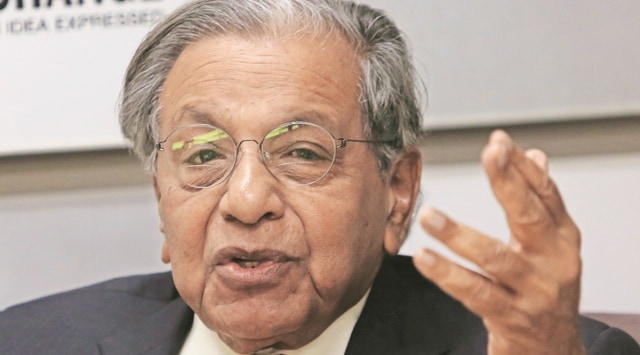Report by G20 group on MDBs to be submitted in 2 parts: NK Singh
On March 28, G20 India Presidency set up the expert group co-convened by Singh and former US Treasury secretary Lawrence Summers. Singh and Summers had invited inputs from the public ahead of the submission of their report ahead of the G20 Finance Ministers and Central Bank Governors meeting in July in Gandhinagar.
 Singh stressed upon the fact that the broadening of vision for MDBs has a moral hazard of overlooking the initial challenges of extreme poverty and shared prosperity. (Express Photo)
Singh stressed upon the fact that the broadening of vision for MDBs has a moral hazard of overlooking the initial challenges of extreme poverty and shared prosperity. (Express Photo)The G20 Expert Group on strengthening multilateral development banks (MDBs) will be submitting its report in two parts, with first report to be submitted in June-end and second report in October, the group’s co-convenor and 15th Finance Commission Chairman NK Singh said on Tuesday.
The first report will focus on the broadening of vision, financial capacity and modalities of funding of the MDBs, while the second report will exhaustively cover mechanisms for coordination among MDBs.
Singh stressed upon the fact that the broadening of vision for MDBs has a moral hazard of overlooking the initial challenges of extreme poverty and shared prosperity. “The big challenge is vision, funding requirement, which includes how can you innovatively fund in terms of getting private capital in…broadening of vision has a moral hazard of diverting money from concessional finance, extreme poverty, shared prosperity to the broadened vision. I will not advocate that. I think we’ll be making a mistake if we ignore extreme poverty in large parts of the African continent, low-income countries. So there needs to be additionality, not substitution,” he said on the sidelines of a consultative meeting of the G20 expert group with non-state organisations on strengthening multilateral development banks.
Multilateral development banks are estimated to require $1 trillion a year for sustainable development, half of which would come from the MDBs and rest from the domestic resources. At present, the annual lending operations of MDBs are estimated to be worth around $122-125 billion, he said.
“Estimates have varied enormously. In terms of multilateral development banks, we need external $1 trillion a year, of which half must come from multilateral development banks, the rest might come from domestic resource mobilisation and other innovative ways…currently it’s $122-125 billion, challenge is how do you take it to $0.5 trillion,” Singh said.
Singh said the first report by the G20 expert group would be given by June 30, which will be presented in the third meeting of the finance ministers and central bank governors under G20 India presidency on July 17-18. “That report will go to the summit on September 9-10 under the Indian presidency. The second report, depending on reactions in the meeting (of finance ministers and central bank governors) and what the summit has to say, will take more intensive work in the second volume particularly in areas of harnessing private capital, foreign exchange issues, guarantees, and innovative financing. The second report will be in time for the annual meeting of IMF and World Bank in the middle of October, which is also synchronising with the fourth and final meeting of the finance ministers and central bank governors of G20 under India’s presidency,” he said.
On March 28, G20 India Presidency set up the expert group co-convened by Singh and former US Treasury secretary Lawrence Summers. Singh and Summers had invited inputs from the public ahead of the submission of their report ahead of the G20 Finance Ministers and Central Bank Governors meeting in July in Gandhinagar.
The expert group has a mandate to develop a roadmap for an updated MDB ecosystem, with milestones and timelines, that includes the vision, incentive structure, operational approaches and financial capacity. It will also evaluate estimates of the finance scale needed to and from the MDBs, including from capital adequacy reforms as well as from public and private sector sources. It will also propose mechanisms for coordination among MDBs.
Chief Economic Adviser V Anantha Nageswaran also noted the need to include other factors of resilience and adaptation along with emission mitigation in the context of climate change for the vision of MDBs. “The effort to tackle climate change is not only emission mitigation…we need funding for adaptation, resilience as well as mitigation…pandemic and war in Ukraine have set back sustainable development goals timelines. In many cases, this will have implications for economic development. Economic development is what is going to give countries their own fiscal resources and private savings, failing which they will be dependent for additional capital which has implications for macroeconomic balances as well,” he said.



































